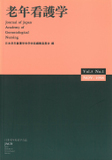Japanese
English
- 販売していません
- Abstract 文献概要
- 参考文献 Reference
痴呆性老人,特に病状が重度で他者に依存せざるを得ない対象にとって,ケアの質がそのQOL(Quality of Life:生活の質)にもたらす影響は大きく,両者は不可分の関係にある.本研究では,痴呆ケアの体系化を試みる第一段階として,看護職の認識する「痴呆性老人のQOLを高めるケア技術」を明らかにすることを目的として質問紙調査を行った.調査の対象は,老人性痴呆疾患治療・療養病棟に勤務する看護職で,有効回答数は509(有効回収率80.7%)であった.因子分析の結果,『患者に合わせた対応』『必要な処置・ケアの遂行』『孤立化の回避』『家族関係の維持』『存在の尊重』『混乱させない対応』『愛着を生かした対応』『全身管理』『安心感の補強』の9つのケア技術が明らかとなった.それらのケア技術の構造について,Maslowの欲求階層説をもとに考察を加えた.
The quality of life of elderly people with moderate to severe dementia is strongly affected by the quality of care they received. Although the importance of the development of dementia care has been recognized, the progress of the study still remains the early stage of the development.
For establishing a framework of dementia care, the skills of the care which were perceived by nurses as improving the quality of life of the demented elderly were investigated. The questionnaire was constructed by extracting effective care elements from literatures of dementia care practice. Self-reported data of 509 nurses working in dementia ward were analyzed. Subsequent factor analysis revealed a nine factor structure of the dementia care skills. The structure of these care skills was discussed with Maslow's theory of human needs.
Copyright © 1998, Japan Academy of Gerontological Nursing All rights reserved.


